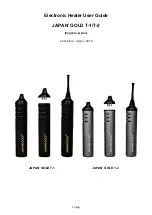
5 - Effects
Core Effects Descriptions
E-MU PCIe Digital Audio Systems
79
Stereo Reverb
Reverberation is a simulation of a natural space such as a room or hall. The stereo
reverb algorithm is designed to simulate various halls, rooms and reverberation plates.
Time
Early Reflections
Late Reverb
Parameter
Description
Decay Time
Sets the length of the Late Reverb. Range 1.5 to 30 seconds
Early Reflections Level
Sets the volume of the initial wall reflections.
Range: 0% to 100%
Early/Late Reverb Bal
Adjusts the balance between early refections and late reverb.
Range: 0% to 100%
Late Reverb Delay
Sets the time between early reflections and the onset of the late
reverb cloud. Range: 1ms to 350ms
Diffusion
Sets the amount of scattering of the late reverb cloud.
Range: 0% to 100%
High Freq. Damping
Sets the rate at which high frequencies die away.
Range: -10.0 to +3.0 damping factor
Low Freq. Damping
Sets the rate at which low frequencies die away.
Range: -10.0 to +3.0 damping factor
Decay time defines the time it takes for the reflected sound from the room to decay or
die away. The diagram below shows a generalized reverberation envelope.
After a short pre-delay period, the echoes from the closest walls or ceiling are heard.
These first echoes, or early reflections, vary greatly depending on the type of room.
Some time after the early reflection cluster ends (late reverb delay), the late reverber-
ation (a dense cloud of complex wall reflections) begins and decays according to the
time set by the Decay Time parameter.
Diffusion is the amount of scattering and density of the late reverberation cloud.
Rooms with many complex surfaces have more diffusion than bare rooms.
High frequency energy tends to fade away first as a sound is dissipated in a room. The
High Frequency Damping parameter adjusts the time it takes for the high frequency
energy to die away and thus changes the characteristics of the room. Rooms with
smooth, hard surfaces are more reflective and have less high frequency damping.
Rooms filled with sound absorbing materials, such as curtains or people, have more
high frequency damping.
The Low Frequency Damping parameter adjusts the time it takes for the low
frequencies to die away. This control adjusts the “boominess” of the room.
















































